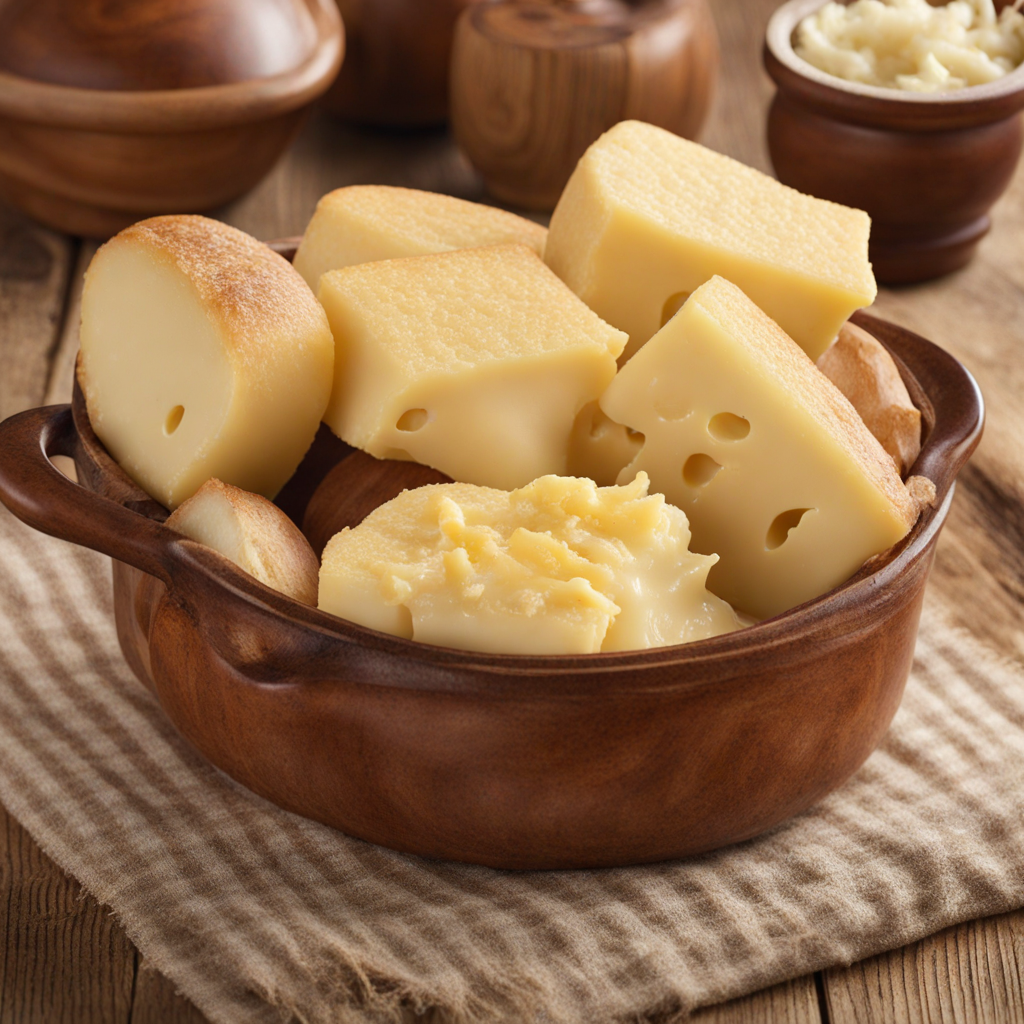Schuedi
Schuedi is a unique dish hailing from Luxembourg, celebrated for its simple yet hearty flavors. This traditional delicacy is essentially a type of potato dumpling, crafted from a mixture of grated raw potatoes and flour, which gives it a delightful texture that is both soft and slightly chewy. The dumplings are typically boiled or steamed, allowing them to retain their natural potato flavor while absorbing the rich sauces or broths they are often served with. The use of local ingredients ensures that each bite is a testament to Luxembourg's agricultural history, showcasing the region's love for wholesome, farm-fresh produce. Once you take a bite of Schuedi, you'll experience a comforting taste that embodies the essence of home-cooked meals. It is often paired with a variety of accompaniments, such as savory meats, stews, or rich gravies, making it a versatile dish that can be enjoyed in numerous ways. The dumplings may also be enhanced with herbs and spices, adding depth and complexity to the overall flavor profile. When served with a hearty sauce, the Schuedi absorbs the flavors, making each mouthful a delightful explosion of taste that is both satisfying and nourishing. In Luxembourg, Schuedi is more than just a meal; it is a cultural experience that brings people together. Families often gather to prepare and enjoy this dish, creating a sense of community and connection. The simplicity of the ingredients belies the labor of love that goes into its preparation, as the process of grating potatoes and forming the dumplings is often a cherished tradition. Exploring Schuedi is not just about tasting a dish but immersing oneself in Luxembourg's culinary heritage, celebrating the flavors and stories that have been passed down through generations.
How It Became This Dish
The History of Schuedi: Luxembourg’s Culinary Treasure #### Origins of Schuedi Schuedi, a traditional dish from Luxembourg, is a delightful, savory treat that reflects the country's rich culinary heritage. Often described as a type of potato cake or flatbread, Schuedi is made primarily from grated potatoes, flour, and sometimes includes additional ingredients like onions, bacon, or herbs. The dish is typically pan-fried until golden brown, resulting in a crispy exterior and a soft, flavorful interior. The origins of Schuedi can be traced back to the rural communities of Luxembourg, where potatoes became a staple food following their introduction to Europe in the 16th century. The potato, originally from South America, quickly adapted to the temperate climate and fertile soil of Luxembourg, becoming a fundamental part of local cuisine. Peasants and farmers, who relied heavily on this versatile tuber for sustenance, created various dishes, including Schuedi, as a way to utilize available ingredients. #### Cultural Significance Schuedi holds a special place in the hearts of Luxembourgers. It is more than just a dish; it embodies the spirit of home cooking and the importance of communal meals in Luxembourgish culture. Traditionally, Schuedi is enjoyed during family gatherings, celebrations, and local festivals. Its preparation often involves multiple generations coming together in the kitchen, sharing stories and laughter as they grate potatoes and mix the ingredients. The dish signifies comfort and tradition, often associated with the changing seasons. In the colder months, when hearty meals are cherished, Schuedi provides warmth and sustenance. Additionally, it is sometimes served with apple sauce or a side of salad, reflecting the Luxembourgish tradition of balancing hearty, savory foods with lighter, sweeter accompaniments. Moreover, Schuedi showcases the agricultural practices of the region. Luxembourg’s fertile lands facilitate the cultivation of potatoes and other vegetables, making the dish a celebration of local produce. The use of locally sourced ingredients not only supports the economy but also fosters a sense of community among farmers and consumers. #### Development Over Time As Luxembourg modernized in the 20th century, the way Schuedi was prepared and consumed evolved. Initially a rustic dish enjoyed primarily by rural families, it began to gain recognition in urban areas as Luxembourg's population became more cosmopolitan. This shift led to a broader appreciation of traditional foods, bringing Schuedi to the attention of chefs and food enthusiasts alike. During this time, culinary influences from neighboring countries such as France, Germany, and Belgium began to permeate Luxembourgish cuisine. As a result, variations of Schuedi emerged, with chefs experimenting with different ingredients and cooking methods. For instance, some began incorporating cheese or using different types of flour to create unique textures and flavors. This experimentation allowed Schuedi to resonate with a wider audience, appealing to both traditionalists and modern palates. In contemporary Luxembourg, Schuedi is often featured on the menus of traditional restaurants and bistros, celebrated as a quintessential Luxembourgish dish. It is not uncommon to find gourmet interpretations that elevate the humble potato cake into a fine dining experience, showcasing the versatility and richness of Luxembourg's culinary landscape. The dish also gained traction during Luxembourg's culinary festivals, where local chefs compete to create the best version of traditional dishes, including Schuedi. These events foster a sense of pride in local cuisine and encourage the preservation of traditional recipes while allowing innovation to flourish. #### Contemporary Revival and Global Recognition In recent years, there has been a resurgence of interest in traditional foods, driven by a global movement toward sustainable and local eating. Schuedi has benefitted from this trend, as chefs and home cooks alike seek to reconnect with their culinary roots. Food bloggers and social media influencers have also played a role in this revival, sharing recipes and personal stories that highlight the dish's significance. Luxembourg's increasing visibility on the international culinary stage has also contributed to the recognition of Schuedi. As the country embraces its culinary identity, efforts have been made to promote traditional dishes to a global audience. This has included participation in international food fairs and collaborations with chefs from other countries, providing opportunities to share Luxembourgish cuisine with the world. Furthermore, Schuedi has found its way into the comfort food category, appealing to expatriates and those with Luxembourgish heritage living abroad. It serves as a nostalgic reminder of home, bringing together family and friends around the dinner table, regardless of geographical boundaries. #### Conclusion The journey of Schuedi from humble rural origins to a celebrated dish in Luxembourg's culinary repertoire illustrates the dynamic nature of food and its ability to connect people across generations. Beyond its delicious taste and texture, Schuedi embodies the values of community, tradition, and the celebration of local ingredients. As Luxembourg continues to embrace its culinary heritage while adapting to modern influences, Schuedi remains a beloved staple that honors the past while evolving for the future. Whether enjoyed in a cozy family kitchen or a trendy urban café, Schuedi is a testament to the enduring power of food to tell stories, foster connections, and celebrate culture. In every bite, it carries with it the legacy of Luxembourg's rich agricultural history and the warmth of shared meals, ensuring that this delightful dish will continue to be cherished for years to come.
You may like
Discover local flavors from Luxembourg







